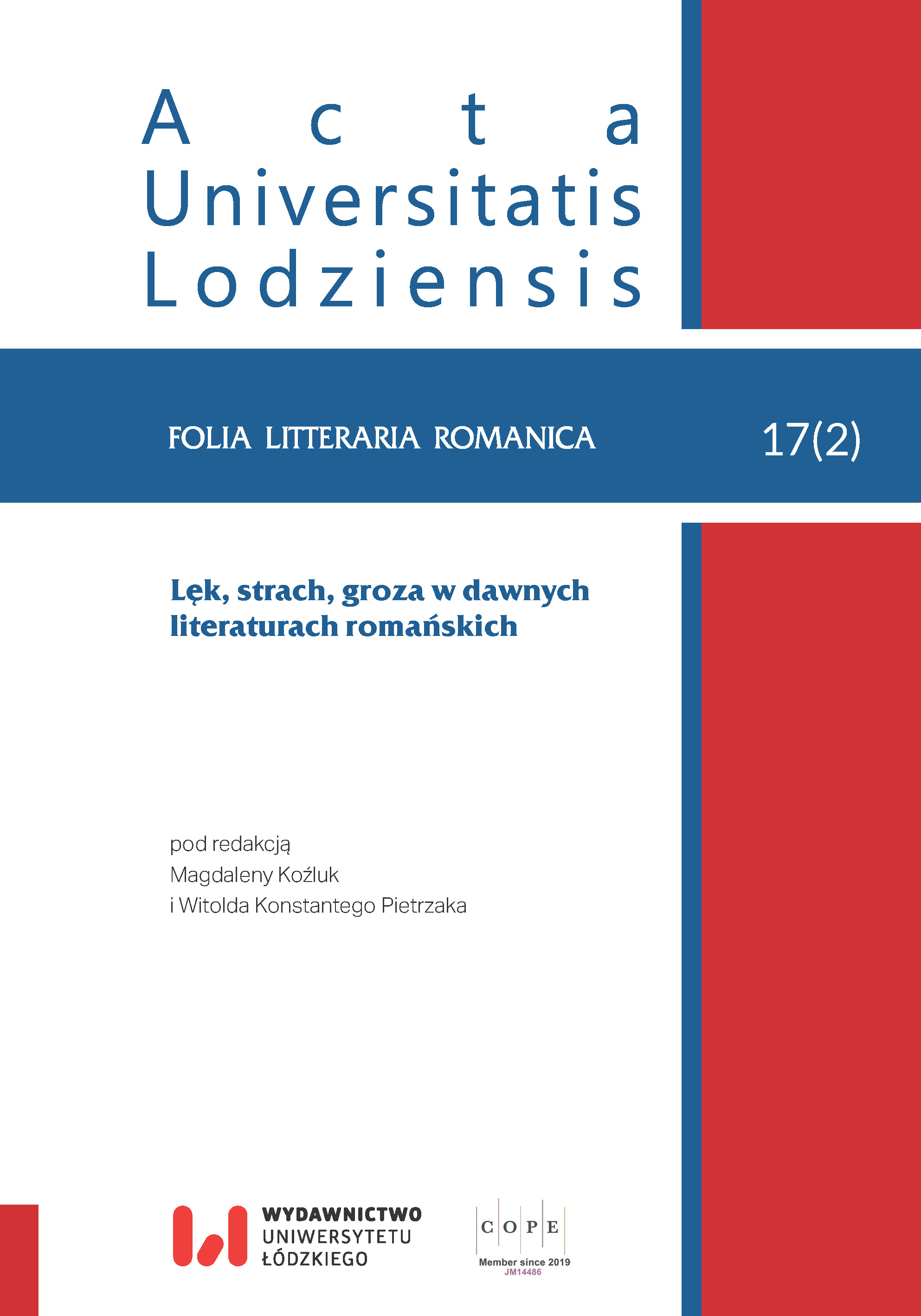Joi aux origines de l’intranquillité dans les communautés émotionnelles des troubadours et trobairitz
DOI :
https://doi.org/10.18778/1505-9065.17.2.03Mots-clés :
troubadours, communautés émotionnelles, amour courtois, littérature médiévale, littérature occitaneRésumé
Cet article vise à analyser l’amour courtois des troubadours en mettant l’accent sur la relation entre le joi et la peur ou l’intranquillité. Sur la base des concepts précédents, le modèle de la fin’amor en tant que communauté émotionnelle avec ses caractéristiques de base est présenté. Sur l’exemple de textes choisis de la littérature courtoise, une « carte des émotions » du monde des troubadours, dans laquelle le joi joue un rôle central, est construite. Joi est défini comme « la joie agissante » ou « un état d’harmonie, d’extase et de perfection intérieure ». L’étymologie de ce concept est considérée comme une combinaison des mots gaudium (joie) et joculum (jeu). L’analyse indique que la poursuite du joi est à la fois la raison de la construction de la communauté émotionnelle de la fin’amor et l’objectif des acteurs impliquées. L’obtention du joi repose sur un système élaboré de jeux littéraires. Dans la communauté émotionnelle, le joi déclenche d’autres émotions, notamment la peur et l’intranquillité. En ce sens, le joi n’est pas un état d’harmonie intérieure mais une entité ambivalente, qui affecte aussi bien le bien-être des acteurs de la fin’amor que son absence.
Téléchargements
Références
Bec, Pierre, « Trobairitz et chansons de femme. Contribution à la connaissance du lyrisme féminin au Moyen Âge », Cahiers de civilisation médiévale, 1979, no 22, s. 235-262 https://doi.org/10.3406/ccmed.1979.2112
Google Scholar
DOI: https://doi.org/10.3406/ccmed.1979.2112
BEdT (Bibliografia Elettronica dei Trovatori), URL: http://www.bedt.it/BEdT_04_25/index.aspx, data dostępu 15.12.2021
Google Scholar
Boase, Roger, The Origin and Meaning of Courtly Love. A Critical Study of European Scholarship, Manchester, Manchester University Press, 1977
Google Scholar
Brejnak, Sebastian, Niepokój. Nowoczesność w świetle anachronicznych konfiguracji doświadczenia nieswojości, WUJ, Kraków, 2019
Google Scholar
Burzyńska, Anna, „Afekt – podejrzany i pożądany”, in Kultura afektu – afekty w kulturze: humanistyka po zwrocie afektywnym, red. Ryszard Nycz, IBL PAN, Warszawa 2015, s. 115-134
Google Scholar
DOI: https://doi.org/10.4000/books.iblpan.8306
Camproux, Charles, Joy d’amor (jeu et joie d’amour), Montpellier, Causse&Castelnau, 1965
Google Scholar
Dauksza, Agnieszka, Afektywny modernizm. Nowoczesna literatura polska w interpretacji relacyjnej, IBL PAN, Warszawa 2017
Google Scholar
DOI: https://doi.org/10.4000/books.iblpan.4293
Dragonetti, Roger, Le gai savoir dans la rhétorique courtoise. Flamenca et Jaufre de Poitiers, Seuil, Paris, 1982
Google Scholar
Duby, Georges, « Le modèle courtois », in Histoire des femmes en Occident. II. Le Moyen Âge, éd. Georges Duby, Michelle Perrot, Christiane Klapisch-Zuber, Paris, Perrin, 2002, s. 323-343
Google Scholar
Dybeł, Katarzyna, „Nic mnie nie cieszy, nic mnie nie smuci prócz Miłowania mego w dali”: poezja trubadurów i truwerów”, in Katarzyna Dybeł, Barbra Marczuk, Jan Prokop, Historia literatury francuskiej, PWN, Warszawa 2005, s. 90-95
Google Scholar
Earnshaw, Doris, The Female Voice in Medieval Romance Lyric, New York, Peter Lang, 1988
Google Scholar
Flamenca, éd. François Zufferey, trad. Valérie Fasseur, Paris, Librairie Générale Française, 2014
Google Scholar
Foucault, Michel, “Sex, Power and the Politics of Identity”, in Michel Foucault, Ethics: Subjectivity and Truth. The Essential Works of Foucault 1954-1984, vol. I, ed. Paul Rabinow, tr. Robert Hurley, New York, The New Press, 1997, s. 163-175
Google Scholar
Frappier, Jean, Amour courtois et Table Ronde, Genève, Droz, 1973
Google Scholar
Freire-Nunes, Irène, Trobairitz et chansons d’ami, Paris, Micro Université, 2012
Google Scholar
Gaunt, Simon, “Poetry of exclusion: A Feminist Reading of Some Troubadour Lyrics”, Modern Language Review, 1990, no 85, s. 310-329, https://doi.org/10.2307/3731812
Google Scholar
DOI: https://doi.org/10.2307/3731812
Huchet, Jean-Charles, « Les femmes troubadours ou la voix critique », Littérature, 1983, no 51, s. 59-90, https://doi.org/10.3406/litt.1983.2204
Google Scholar
DOI: https://doi.org/10.3406/litt.1983.2204
Jeanjean, Henri, “Flamenca: a wake for a dying civilization?”, Parergon, 1998, vol. 16, no 1, s. 19-30, https://doi.org/10.1353/pgn.1998.0125
Google Scholar
DOI: https://doi.org/10.1353/pgn.1998.0125
Lacan, Jacques, The Ethics of Psychoanalysis, London, Routledge, 1992
Google Scholar
Moore John C., “‘Courtly Love’: A Problem of Terminology”, Journal of the History of Ideas, vol. 40, no 4, 1979, s. 621-632, https://doi.org/10.2307/2709362
Google Scholar
DOI: https://doi.org/10.2307/2709362
Oliver, Sophie, “Subversive Acts: Female Voice and Performance in the Songs of the trobairitz”, French Studies Bulletin, 2005, no 95, s. 2-7, https://doi.org/10.1093/frebul/kti012
Google Scholar
DOI: https://doi.org/10.1093/frebul/kti012
Rieger, Angelika, Trobairitz: der Beitrag der Frau in der altokzitanischen höfischen Lyrik, Tübingen, Niemeyer, 1991, https://doi.org/10.1515/9783110933413
Google Scholar
DOI: https://doi.org/10.1515/9783110933413
Rosenwein, Barbara, Wspólnoty emocjonalne we wczesnym średniowieczu, tł. Grażyna Urban-Godziek, IBL PAN, Warszawa 2016
Google Scholar
DOI: https://doi.org/10.4000/books.iblpan.5260
Roubaud, Jacques, La fleur inverse. Essai sur l’art formel des troubadours, Paris, Ramsay, 1986
Google Scholar
Roubaud, Jacques, Les Troubadours. Anthologie bilingue, Paris, Seghers, 1971
Google Scholar
Sawczuk-Szadkowski, Michał, „Flamenca i Radość Gry w świecie trubadurów”, Terminus (w publikacji)
Google Scholar
Schnell, Rüdiger, « L’amour courtois en tant que discours courtois sur l’amour », Romania, 1989, t. 110, no 439-440, s. 72-126, 331-363, https://doi.org/10.3406/roma.1989.1622
Google Scholar
DOI: https://doi.org/10.3406/roma.1989.1622
Taylor, Robert A., “The Love Ethic: Definition of Fin’amors”, in Bibliographical Guide to the Study of the Troubadours and Old Occitan Literature, Kalamazoo, Medieval Institute Publications, 2013, p. 57-73
Google Scholar
Žižek Slavoj, Metastazy rozkoszy. Sześć esejów o kobietach i przyczynowości, tł. Marek. J. Mosakowski, Wydawnictwo Krytyki Politycznej, Warszawa 2013
Google Scholar
Téléchargements
Publiée
Versions
- 2023-08-10 (2)
- 2022-12-30 (1)
Comment citer
Numéro
Rubrique
Licence

Ce travail est disponible sous licence Creative Commons Attribution - Pas d'Utilisation Commerciale - Pas de Modification 4.0 International.











